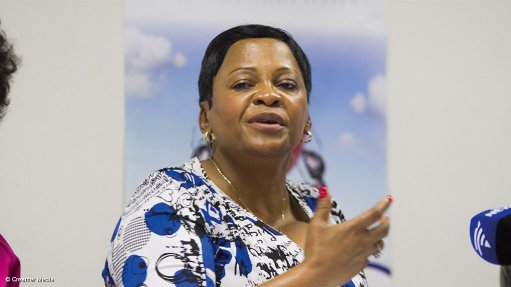
Water and Sanitation Minister Nomvula Mokonyane
Photo by: Duane Daws
State-owned water utility Rand Water has resolved to use load shifting to correct current imbalances in water supply in Gauteng, the Department of Water and Sanitation (DWS) said on Friday.
According to Rand Water, the water shortages, which first started in the west of Johannesburg on September 15, were caused by power outages, which coincided with the expected increase in water demand as the season changed from winter to spring, with ageing infrastructure and vandalism also having contributed to the problem.
According to reports on Friday morning, two suburbs in Johannesburg – South Hills and Rabie Ridge – and two in Ekurhuleni – Bedfordview and Primrose – were still without water.
The DWS explained that the load shifting that would now be employed was a measure whereby water supply was shifted from an area of normal supply to one where there had been no water by redirecting the flow to the latter, thus ensuring that communities which had been without water would receive supply at fixed intervals until water supply returned to normal.
While the water distribution from the system is redirected, communities where water is blocked will be provided for through water tankers, the DWS said.
Addressing the media after a meeting with Rand Water top management, Water and Sanitation Minister Nomvula Mokonyane said about a quarter of the water normally distributed by Rand Water would be used in the redistribution process.
“There will also be additional pumping that will take place to restore normal operations and supply to the affected areas of Tshwane, Ekurhuleni, Johannesburg and some of the high-lying areas of Mogale City,” the Minister noted, adding that “everything will be normalised” within a period of two weeks.
Meanwhile, she also emphasised the importance of communication throughout this period and, as a result, a helpline had been established. The helpline could be reached by dialling 0860 101 060.
“We will have a communication centre so that we do not have a distortion and high levels of anxiety in our communities,” the Minister stated.
Furthermore, to ensure homogeneous spread of information, the department would partner with the public broadcaster, the South African Broadcasting Corporation, as well as community radio stations.
Mokonyane said communities would be updated at least four times a day on the water situation.
She further pointed out that the DWS was also starting to work on longer-term solutions, stating that there had to be a Gauteng water master plan that considered infrastructure, water consumption and water management in a holistic way.
“There [are the] issues of aged infrastructure and water conservation and, most importantly, we need to go back and look at alternative energy supply for water so that we do not just rely on one source of energy. We need to look at other means and we have tasked Rand Water to work with our other sister entities to look at this solution,” the Minister said.
Mokonyane was also scheduled to meet with Gauteng Premier David Makhura’s Coordinating Forum on Friday afternoon to discuss the current water supply interruptions, while the Parliamentary Portfolio Committee on Water and Sanitation also on Friday held an urgent meeting with Rand Water to seek solutions to the continuing shortages.